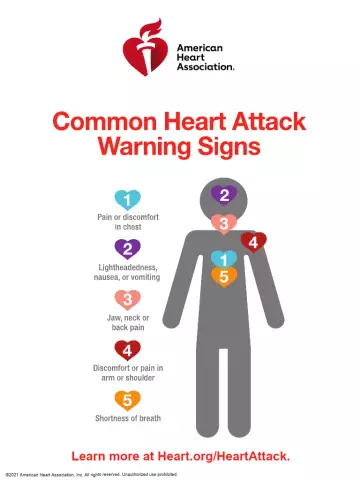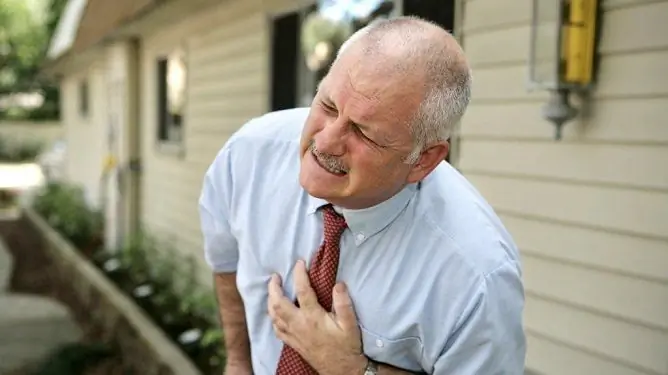- Author Rachel Wainwright wainwright@abchealthonline.com.
- Public 2024-01-15 19:51.
- Last modified 2025-11-02 20:14.
Alcoholic epilepsy
The content of the article:
- General information
- Causes and classification
- Symptoms
- Complications and consequences
- Diagnostics
- Treatment of alcoholic epilepsy
- Forecast
- Video
Alcoholic epilepsy is one of the symptomatic forms of the disease that develops as a result of alcohol abuse. Most often, pathology occurs in people suffering from stage II-III alcoholism. It is extremely rare for epileptic seizures to occur in a person who has occasionally taken a large dose of alcohol.

Alcoholic epilepsy usually develops in people who abuse alcohol for a long time
General information
Alcoholic epilepsy combines a whole group of pathological conditions characterized by the occurrence of non-convulsive or convulsive seizures. The disease is more often diagnosed in men over the age of 30. Its characteristic features are:
- the presence of a clearly traceable relationship between the episode of alcohol intake and epileptic seizures;
- absence of epileptic foci on the electroencephalogram (EEG);
- high incidence of non-convulsive seizures.
Before the onset of a seizure, the patient may experience sudden mood swings, the appearance of aggression towards the people around him. Often, seizures in chronic alcoholics are the first harbingers of developing delirium tremens (alcoholic delirium) - a type of acute alcoholic psychosis.
The development of large generalized seizures is accompanied by a sudden fall of a person, which can cause injuries of varying severity.
Treatment of alcoholic epilepsy is carried out jointly by a narcologist and an epileptologist.
Causes and classification
The main cause of the disease is alcoholic intoxication of brain cells, caused by the toxic effect of ethanol. The likelihood of developing an attack increases under the influence of the following factors:
- taking alcohol surrogates (moonshine, various alcohol-containing liquids intended for household purposes);
- prolonged binge;
- traumatic brain injury;
- genetic predisposition to the development of epilepsy;
- volumetric neoplasms of the brain;
- neuroinfection (encephalitis, meningitis, arachnoiditis);
- disorders of cerebral circulation.
However, in the medical literature, the term "alcoholic epilepsy" is often used to define certain conditions:
| Pathological condition | Description |
| Epileptic reaction | Episodic or single seizures that occur in people who do not suffer from chronic alcoholism, but are associated with a single intake of large doses of alcohol. In most cases, an attack develops the day after drinking alcohol. The disappearance of the manifestations of the hangover syndrome is accompanied by the cessation of seizures. |
| Epileptic syndrome | A widespread pathology that manifests itself in patients with chronic alcoholism. The patient has repeated seizures, combined with severe somatic and mental disorders due to the underlying disease. In some cases, the development of an attack may be preceded by an aura resembling hallucinations or illusions. |
| Alcoholic epilepsy | This form of the disease develops mainly in people suffering from chronic alcoholism for a long time (over 10-12 years). The attack develops after a heavy binge at the height of the withdrawal syndrome and often ends with a transition to alcoholic psychosis. |
Symptoms
True alcoholic epilepsy is always characterized by a connection between the occurrence of seizures and the following factors:
- drinking alcoholic beverages;
- the development of withdrawal symptoms;
- development of alcoholic psychosis.
As a rule, the pathological conditions listed above do not develop at the time of taking alcoholic beverages, but after a certain time (2-4 days) after stopping their use or significantly reducing the dose, usually at the height of the manifestations of withdrawal symptoms.
The patient may have both non-convulsive and convulsive seizures. The severity and nature of the attack are different, ranging from a short-term disturbance of consciousness and ending with generalized tonic-clonic seizures. In severe cases, seizures occur continuously, in between, the patient does not regain consciousness. This condition is regarded as status epilepticus.
Non-convulsive seizures are more common in alcoholic epilepsy. They are characterized by:
- disturbances of consciousness;
- motor automatisms;
- severe dysphoria (painful low mood).
Patients do not have the phenomenon of polymorphism, that is, once an attack occurs, it proceeds further without any changes in the clinical picture, according to the same scheme.
Atypical for alcoholic epilepsy are:
- psychomotor seizures (changes in consciousness in combination with motor automatisms or seizures);
- psychosensory seizures (sensation of a flash or electric shock before the eyes, ringing in the ears);
- absences (short-term [for 5-15 seconds] loss of consciousness).
During a generalized seizure, the phase of tonic seizures predominates. Before it begins, patients usually develop cyanosis of the skin of the face and upper body. The attack begins with a sudden cry of the patient, after which he loses consciousness and falls. The muscles are tense, the arms are bent at the elbows, the legs are straight. Foam comes out of the mouth, which can turn pink from biting the tongue. Involuntary urination and bowel movements are possible.
Minor seizures in patients with alcoholism are not always easily recognized by the surrounding people. The following symptoms should alert you in terms of epilepsy:
- sudden freezing of the patient;
- pronouncing phrases that do not correspond to the topic of conversation or sudden stopping of speech;
- look fixed at one point.
Minor seizures are often preceded by precursors:
- irritability;
- increased anxiety;
- pronounced depression of mood.
People around them usually perceive such symptoms as manifestations of withdrawal symptoms and do not call a doctor to the patient.
Alcoholic epilepsy has characteristic distinctive features in the course of the post-attack period. So, patients with an idiopathic form of the disease after an attack feel fatigue, weakness, drowsiness. Less often, they have psychomotor agitation or twilight consciousness. In patients with alcoholic epilepsy, after an attack appear:
- emotional dreams saturated with fantastic images;
- insomnia;
- superficial, often interrupted sleep;
- early awakening.
Complications and consequences
In about half of the cases, after suffering an episode of alcoholic epilepsy, patients experience prolonged insomnia, lasting over 24-48 hours. Against her background, delirium can develop - an acute psychosis, which is characterized by bright visual hallucinations (devils, mystical creatures, aliens).
With repeated seizures, their nature and severity remain the same. Changes in personality traits are more consistent with chronic alcoholism than epileptic processes.
Diagnostics
Diagnosis is carried out on the basis of the characteristic clinical symptoms of the disease and anamnesis data. The main diagnostic value is to identify the relationship between the onset of seizures and an indication of alcohol abuse.
Instrumental studies in the diagnosis of alcoholic epilepsy are not very informative. On an electroencephalogram, it is usually not possible to fix epileptic signs.
Treatment of alcoholic epilepsy
When a patient develops a convulsive seizure, he needs to provide first aid (move away from furniture items, provide an influx of fresh air) and call an ambulance.
With repeated generalized seizures, the development of status epilepticus, the patient is hospitalized in the intensive care unit, where treatment will be carried out aimed at stopping seizures and maintaining the basic vital functions of the body. Drug therapy includes taking the following drugs:
- Sodium thiopental;
- Hexobarbital;
- Diazepam;
- salt solutions;
- glucose solutions.
In all other cases, patients are hospitalized in the narcological department. Carbamazepine (Finlepsin) is usually prescribed as an anticonvulsant drug. If therapy is ineffective, with great care and under close control, carbamazepine is replaced with Phenobarbital (Luminal), since the latter drug in chronic alcoholics quickly forms a pronounced drug dependence.

Carbamazepine is used for alcoholic epilepsy in a short course, as it causes addiction in alcoholics
Achieving a stable therapeutic effect is possible only if the patient completely refuses to continue drinking alcohol.
Chronic alcoholism is treated by a narcologist. The therapy regimen may include:
- pharmacological agents;
- group and individual psychotherapy;
- drug coding (subcutaneous insertion of implants, intravenous administration of drugs);
- hypno-suggestive techniques.
After the end of the main course of treatment, the patient should be on long-term dispensary treatment. If indicated, he can be sent for a rehabilitation course to a specialized clinic or sanatorium.
Forecast
In the case of a complete refusal to drink alcohol, the prognosis is favorable. Seizures usually do not recur, and personality changes characteristic of long-term epilepsy do not develop. Existing mental disorders are determined exclusively by the stage of chronic alcoholism.
If the patient continues to take alcoholic beverages, seizures will occur more often over time.
A generalized seizure is followed by falls and can cause serious injury. The greatest danger to health and life is the development of status epilepticus.
Video
We offer for viewing a video on the topic of the article.

Elena Minkina Doctor anesthesiologist-resuscitator About the author
Education: graduated from the Tashkent State Medical Institute, specializing in general medicine in 1991. Repeatedly passed refresher courses.
Work experience: anesthesiologist-resuscitator of the city maternity complex, resuscitator of the hemodialysis department.
Found a mistake in the text? Select it and press Ctrl + Enter.






